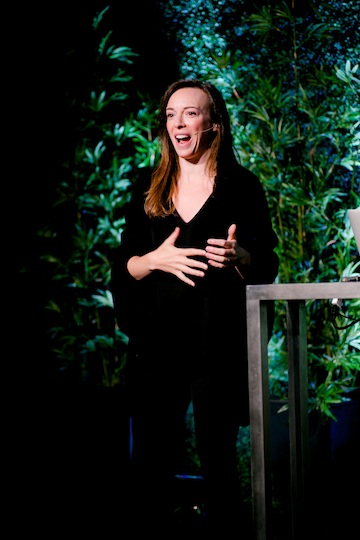Dr. Dan Ezekiel, left, and Ezra Shanken with JFSA Innovators Lunch co-chairs Shannon Ezekiel, left, and Dr. Sherri Wise. (photo by Rhonda Dent Photography)
“Something that we never could have imagined to be possible eventually became a reality because of our continued dreams,” said Beth Israel Rabbi Jonathan Infeld, referring to the establishment of the state of Israel, the 69th anniversary of which took place on the day he addressed the 13th Annual Jewish Family Service Agency Innovators Lunch.
“The JFSA as an organization,” he said, “continually looks forward to and works for ending hunger and poverty, healing those with mental illness and other challenges, solving issues of housing for our community – dreams that may at this moment seem impossible but, with the extremely dedicated and talented staff and donors and people who care about the JFSA, this is a dream that I believe is within our capacity.”
JFSA’s capacity was strengthened by the success of the May 2 lunch at Hyatt Regency Vancouver, which featured Kiva founder Jessica Jackley as the keynote speaker. After three years of declining donations, the 2017 event set a record – $340,224 has been raised from the lunch to date, writes JFSA chief executive officer Richard Fruchter in the agency’s May 24 enewsletter. The Edwina and Paul Heller Memorial Fund helped this year’s total by matching new gifts and any increases in renewed gifts to the event, up to a total of $25,000.
Co-chaired by Dr. Sherri Wise and Shannon Ezekiel, the lunch began with a welcome from Karen James, chair of JFSA’s board of directors. Fruchter then provided an update on the varied activities of the organization, including the services they offer the non-Jewish community. “We strive to make a difference for each and every person who walks through our doors,” he said.
This year’s short video shared the stories of a few people who JFSA has helped, including that of a young man struggling with anxiety and depression who received counseling at JFSA and a couple who received help finding needed subsidized housing for seniors. It also focused on the story of Tea and her father, Zadik.
“It’s remarkable to see a multi-generational story like Tea’s, whose family first arrived in Canada from wartorn Bosnia with almost nothing,” writes Fruchter in the May newsletter. “JFSA was there to welcome them, provide help and support as they adjusted to life in Canada and became productive citizens. Now, nearly 25 years later, we’re supporting her father, Zadik, a Holocaust survivor, through the [Claims Conference] Jewish Victims of Nazism program.”
At the lunch, JFSA board member and development chair Jody Dales told the audience of more than 600 that one of her and her husband’s main concerns is alleviating poverty, and that’s why they came to work with JFSA. She spoke about the importance of JFSA’s services for seniors with low incomes, and noted that this group includes Holocaust survivors. She spoke of the importance of the counseling that JFSA provides in a province where waitlists for psychiatrists can be eight months or longer.
JFSA spends more than $100,000 a year on operating the Jewish Food Bank and close to $400,000 making food vouchers available, said Dales. In the last few years, she added, the demand for vouchers has almost doubled and JFSA has had to reduce the amounts provided, from approximately $65 per month per individual, to $45. In addition, the agency has had to stop accepting new requests. Approximately five new people or families request to be put on the voucher list each month and all must be turned away, she said.
Shay Keil, director of wealth management at Keil Investment Group, introduced Jackley. Kiva, the microloan platform she launched in 2005, allows users to give loans of as little as $25 to entrepreneurs anywhere in the world. According to its website, Kiva has connected 1.6 million lenders with 2.4 million borrowers, facilitating almost $1 billion in microloans, which have a repayment rate of 97.1%.

In her Innovators talk, Jackley emphasized her journey from caring for the poor to helping them empower themselves, illustrating along the way how a small idea in social innovation, like Kiva, can grow and have such a large impact.
She told the Vancouver Sun in an interview, “I think people assume giving is a financial transaction, but what I am way more interested in and what changes the giver, is participating in someone else’s story and doing something outside your comfort zone, giving of your time, sharing a resource.”
“We all have something to offer, and it may not be money,” she also told the Sun. “As we expand the set of what we see as possible things to share, to give, I think we’ll see more abundance and possibility.”
The record revenue raised at this year’s Innovators comes at a time when the demands on JFSA are at record levels. The cost of living in Metro Vancouver, combined with rising food prices, particularly for produce, protein and dairy-based staples, is creating a crisis for many families, Fruchter told the Independent.
“In the past year, due to increasing hardship, the number of families having to use the Jewish Food Bank twice a month has almost doubled. Weekly phone calls seeking help with housing have also doubled over the past two years,” said Fruchter, and demand for help from new immigrants is also high.
“In the past year,” he said, “we have helped over 350 families make their new home in Canada.”
Matthew Gindin is a freelance journalist, writer and lecturer. He writes regularly for the Forward and All That Is Interesting, and has been published in Religion Dispatches, Situate Magazine, Tikkun and elsewhere. He can be found on Medium and Twitter.

